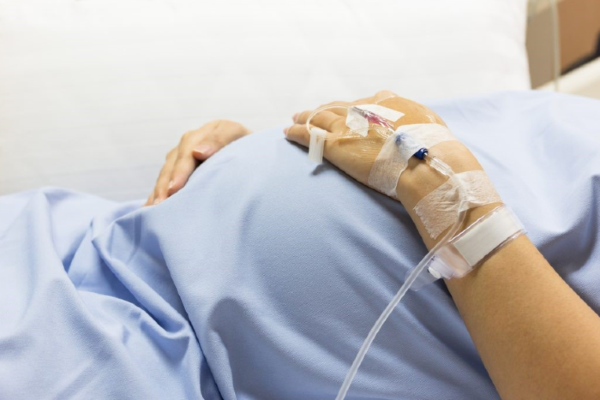Itching is often a symptom of pregnancy, thought to be caused by raised levels of chemicals in the blood, like hormones.
However, itching can also be caused by a relatively rare liver condition named intrahepatic cholestasis of pregnancy (ICP), or obstetric cholestasis.
American actress Kate Mara has recently spoken out about the gestational condition, after requiring emergency medical intervention while giving birth to their daughter in May.
The actress rose to fame on the show House of Cards, and recently gave birth to herself and Billie Elliot actor Jamie Bell's daughter via caesarean section on May 27.
The 36-year-old developed a fever of 102 at 37 weeks pregnant and had a troubling birthing experience.
She has since gone public about her cholestasis diagnosis on Dr. Berlin's Informed Pregnancy podcast, describing her "terrible shakes" from the pre-surgery medication and severe bleeding:
“I thought my teeth were going to pop out, my jaw was clenched so tight from the shakes, and then I thought, ‘I definitely can’t hold her because I can’t move.’ My arms were locked.”
Cholestasis is a condition affecting the liver, which slows and stops the flow of bile in the digestive system due to pregnancy hormones. This can cause the overflow of bile to seep into the bloodstream, which can lead to dangerous results.
Extreme itchiness is the main symptom of the condition, but it can be missed by doctors and mums since stretching belly skin is already itchy.
Diagnosing a condition such as cholestasis can be difficult, and other symptoms include; dark urine colour, pain in the upper abdomen, itchy hands and feet, jaundice and pale stools.
Our #ICPCare Infographic is a wonderful resource for #itchymoms and a great way to spread awareness of #Cholestasis #Pregnancy during ICP Awareness Month. Share this infographic and help save a baby's life! #icpawareness #obgyn #midwives #obnurse https://t.co/g3yA3lEvs1 pic.twitter.com/fVhtrMGEaG
— ICP Care (@ICPcare) June 19, 2019
In the UK alone, ICP affects one-in-140 women and needs medical attention. For many women with the disorder, itching is often worse at night and more noticeable in the hands and feet.
Symptoms begin typically around 30 weeks of pregnancy, but it's possible to develop the condition much earlier.
You can become diagnosed with tests to check your liver function (LFT) and measurements of your bile acid levels (BA). Your medical history and blood tests will also be analysed.
Your cholestasis condition will be monitored by regular liver function tests by your doctor if you are diagnosed with the condition.
It seems to run in families, and is more common in women of South American, Pakistani and Indian origin.
If you've experienced the condition in previous pregnancies, there is a high chance of developing it again in another pregnancy.
Due to the link with stillbirth, you may be offered induction of labour at around 37 to 38 weeks of pregnancy if you have cholestasis.
If you have cholestasis, it will most likely be recommended that you give birth in hospital under a consultant-led maternity team. Vitamin K is normally offered as a blood-clotting prevention supplement.
Some specialists might also advise you to go with an earlier induction than 37 or 38 weeks if the condition is severe (bile acids over 40µmol/L). Medications like ursodeoxycholic acid (UDCA) can help to reduce bile acids and ease itching.
The Royal College of Obstetricians and Gynaecologists and the British Liver Trust advise weekly tests and bile acid measurements. Doctors can then recommend the best time for birth.
Unfortunately, there's no current cure for intrahepatic cholestasis of pregnancy, but once you give birth the disorder should go away on it's own.
For more information, The Royal College of Obstetricians and Gynaecologists has advice regarding obstetric cholestasis, including treatment options.
You can also get information from mums and clinical experts alike from the British Liver Trust and the ICP Support charity.










